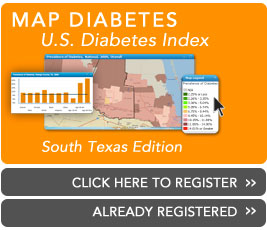Posted by Staff
Clinical Trials
Wednesday, July 31st, 2013
Diabetes Care: August 2013
OBJECTIVE Canagliflozin, a sodium glucose cotransporter (SGLT) 2 inhibitor, is also a low-potency SGLT1 inhibitor. This study tested the hypothesis that intestinal canagliflozin levels postdose are sufficiently high to transiently inhibit intestinal SGLT1, thereby delaying intestinal glucose absorption.
RESEARCH DESIGN AND METHODS This two-period, crossover study evaluated effects of canagliflozin on intestinal glucose absorption in 20 healthy subjects using a dual-tracer method. Placebo or canagliflozin 300 mg was given 20 min before a 600-kcal mixed-meal tolerance test. Plasma glucose, 3H-glucose, 14C-glucose, and insulin were measured frequently for 6 h to calculate rates of appearance of oral glucose (RaO) in plasma, endogenous glucose production, and glucose disposal. Read more
Posted by Staff
News
Wednesday, July 24th, 2013
ADA: July 22, 2013
A retrospective cohort study of more than 80,000 people
OBJECTIVE To determine time to treatment intensification in people with type 2 diabetes treated with one, two, or three oral antidiabetes drugs (OADs) and associated levels of glycemic control.
RESEARCH DESIGN AND METHODS This was a retrospective cohort study based on 81,573 people with type 2 diabetes in the U.K. Clinical Practice Research Datalink between January 2004 and December 2006, with follow-up until April 2011. Read more
Posted by Staff
News
Wednesday, July 24th, 2013
The Huffington Post: 07/11/2013 pm
Imagine the upheaval in our economy — on manufacturers, on jobs, on wages, on the availability of consumable goods — if, with the stroke of a pen, the cost of cars, computers, homes, land, clothing or food were reduced by 72 percent. Effective July 1, 2013 the Centers for Medicare & Medicaid Services (CMS) will assert its authority to set prices by cutting reimbursements by 72 percent for diabetes blood glucose meters and supplies — often described as self-monitoring blood glucose (SMBG) systems. Over the next 10 years, they estimate, this policy change will reduce beneficiary co-payments by $17.2 billion, and save Medicare up to $25.8 billion.
If you are challenged with managing diabetes, you may applaud this new payment policy as an all-too rare, but welcome, pro-patient decision. If you or your loved ones don’t have diabetes, you may be inclined to overlook this announcement as benign, and not particularly relevant to your health and family economics.
In either instance, you would be mistaken. Our collective interest is tied up in reversing the shortsightedness that this form of market contraction represents. Read More
Posted by Staff
News
Wednesday, July 24th, 2013
AACE: 7/11/13
NEW! American Association of Clinical Endocrinologists’ Comprehensive Diabetes Management Algorithm 2013
Consensus Statement published in Endocr Pract. 2013;19 (Suppl 1):1-48
Lifestyle optimization is essential for all pa-tients with diabetes. This is multifaceted, ongoing, and engages the entire diabetes team. However, such efforts should not delay needed pharmacotherapy, which can be initi-ated simultaneously and adjusted based on the response to lifestyle efforts. The need for medical therapy should not be interpreted as a failure of lifestyle management, but as an adjunct to it. Read more
Posted by Staff
News
Wednesday, July 24th, 2013
SAGE: February 5, 2013
Background: Despite evidence that improved outcomes are associated with more distal lower extremity amputations (LEA), the impact of recent advances in the orthopedic approach to diabetic foot ulcer (DFU) on the use and anatomic level of LEAs is unknown.
Methods: We queried the complete Medicare Part B claims database (2000-2010) for volume and reimbursement of all codes designating LEAs (hip and below) as well as a selection representing orthopedic treatments for DFU. Procedures were grouped for analysis; utilization rates per 100,000 Medicare enrollees and compound annual growth rates (CAGRs) of payments were calculated. Data are presented in the context of national health care spending trends. Read more
Posted by Staff
Minority Diabetes Reports
Wednesday, July 24th, 2013
Diabetes Care: July 22, 2013
OBJECTIVE This study used qualitative interviews with black and Latino participants with diabetes to further understanding about types of foods eaten, food preparation, sources of foods and meals, communication with providers, and effects of race and ethnicity on eating in this population.
RESEARCH DESIGN AND METHODS Researchers recruited black and Latino adults from East Harlem, New York, to participate in four English and Spanish focus groups. Discussions were transcribed, coded, and analyzed to uncover prevalent themes, which were interpreted with the Common Sense Model of Self-Regulation. Read more
Posted by Staff
Minority Diabetes Reports
Wednesday, July 24th, 2013
The Journal of Clinical Endocrinology & Metabolism: July 19, 2013
Context: Although overweight and obese African-Americans (AA) have less visceral adipose tissue (VAT) and liver fat (LF) than Hispanics, they have a similar risk for type 2 diabetes (T2D).
Objective: We examined ethnic differences in the association between VAT and LF with risk factors for T2D to help explain this paradox.
Design: Cross-sectional study.
Subjects: Overweight and obese AA (n=131; 15.5±3.3 years) and Hispanic adolescents (n=227; 14.7±3.0 years).
Main Outcome Measures: Insulin sensitivity (SI), acute insulin response (AIR), and disposition index (DI) by FSIVGTT and minimal modeling. Read More



























